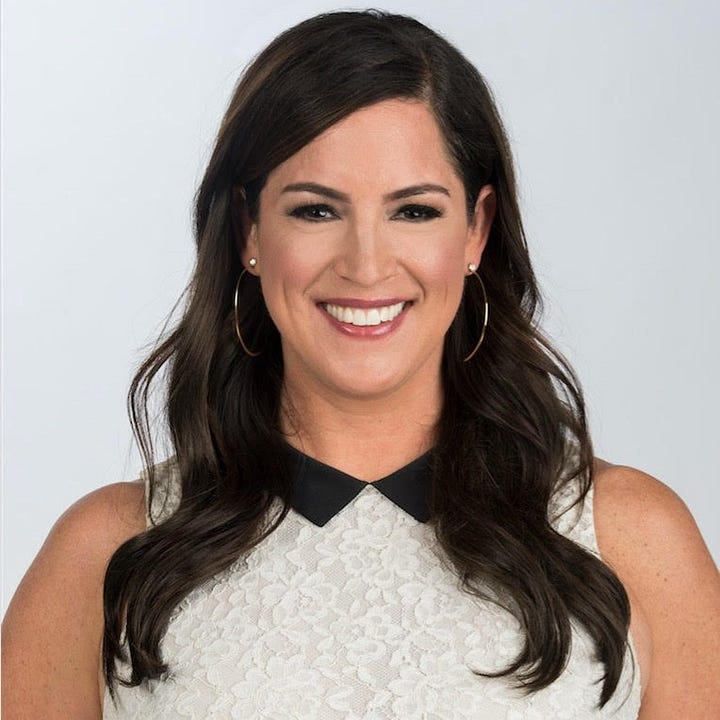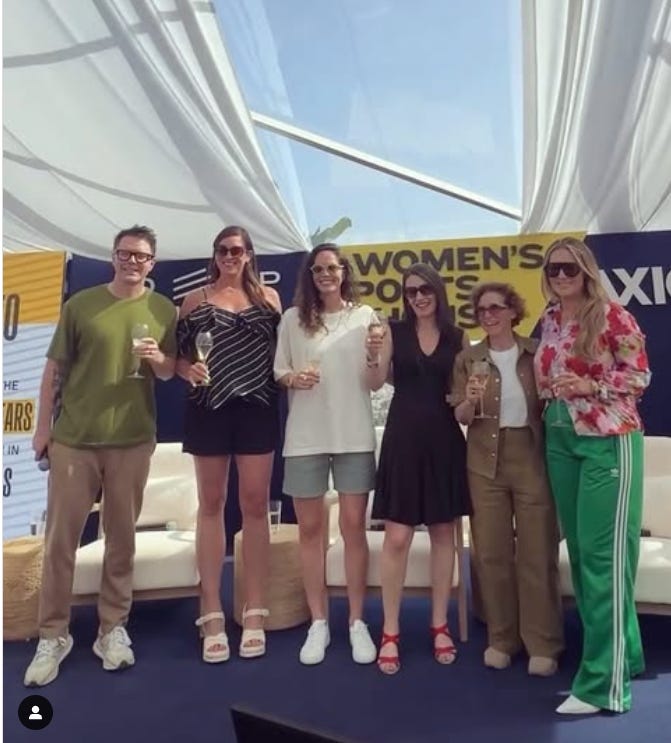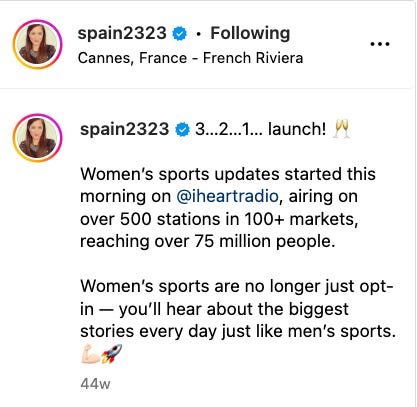How iHeartMedia is changing the sports radio game
“Our network is like an act of resistance right now.”
Hi, friends! So, last June iHeartMedia launched something long overdue— a full-on audio network just for women’s sports, the iHeart Women’s Sports Network.
Naturally, I wanted to know everything about this new venture, so earlier this month, I talked to two key people making it all happen: Jessie Katz, the head of iHeart Women’s Sports, and Sarah Spain, the host of Good Game with Sarah Spain, the network’s flagship daily podcast that covers all the news in women’s sports.
We got into the nitty-gritty of how this idea came to life and how the network has grown over the last year — iHeart Women’s Sports now features 15 podcasts, including Levels to This with Sheryl Swoopes and Terrika Foster-Brasby; Throttle Therapy with Katherine Legge; In Case You Missed It with Khristina Williams; and The Rennae Stubbs Tennis Podcast.
And because this is Power Plays, we also talked about the deeper stuff: media equity, audience-building, and the reality of navigating this work in a very politically charged moment. You’re going to love this conversation.
As always, thank you so, so much for your support of Power Plays!
Okay. Let’s do this.
A Q&A with Jessie Katz and Sarah Spain of iHeart Women’s Sports


This interview has been edited and condensed for readability, length, and clarity.
POWER PLAYS: We have a little bit of a nerdier audience here at Power Plays, so we’re always interested in the behind-the-scenes details of how projects like the iHeart Women’s Sports come together. Why did iHeart decide to make this decision to really invest in women's sports and start this network?
JESSIE KATZ: I think it's something that iHeart has done before in different areas —launching the Black Effect network, or My Cultura, they always have their eye out for underrepresented audiences and voices in audio and look to fill those gaps with full fledged audio networks. So a year, year and a half ago, it was becoming more and more apparent that the next big blank space in audio was women's sports coverage. Deep Blue Sports and Entertainment, Laura Correnti [the founder and CEO], approached iHeart with the idea of launching the first ever audio network dedicated exclusively to covering women's sports, and to do that on broadcast and podcast, to tackle this in the most significant way that you can. Considering iHeart's reach, it was kind of the no-brainer platform from her point of view.
Right out of the gate, [Correnti] thought to try to bring Sarah into it to launch a daily show that was going to cover women's sports, because it just quite literally didn't exist. We were able to ask Sarah to not only host a daily podcast covering women's sports, but also to voice those radio reports. Then we were able to bring on a few founding partners. I know you've been covering e.l.f. and what they've been doing in the women's sports space, they're one of our three founding partners that came on board from launch, along with Capital One, and then a little bit later, Novartis. We launched the women’s sports reports in June, and Sarah's show Good Game launched in July, and we've kind of been off to the races from there.
SARAH SPAIN: One thing I think your readers will find interesting is … Laura Correnti’s background is in creating content and meeting advertisers where they live. What she found was that there was no inventory for the people who did want to invest in women's sport. There's very little shoulder programming — yes, there are rights packages, but the same couple of brands that kept buying were either running out of things to buy or it was harder for other brands to get into the space. The lack of investment was in part due to the fact that there just wasn't programming. So she realized, not only do we need to serve the fans, but we need to create enough programming to allow people that wanted to invest to get into the space.
And to clarify, they did not come to me with the daily show concept. I’m an asshole and after 13 straight years of being like, “I wonder what life would be like if you didn't have a show every day,” and then [leaving ESPN radio and] realizing, “Oh, it's lovely,” they were like, “What do you think the network needs?” and I was like, “A daily show!” (Laughter.)
But also just a fun note that Laura [Correnti] and I met in Australia for the first time with Angel City, doing World Cup stuff. And when she reached out about Deep Blue and came with the big pitch to join this network, she made sure Sue Bird was the one who called me. So, very smart move on her part.


PP: Yeah, I literally would not be able to say no to anything Sue Bird asked me to do, that would be very effective! Now, I’m experienced in podcasting but don’t have Sarah’s experience in radio. When you're talking about these sports reports, do these just go on all the iHeart channels? Are these like regular score updates?
SS: Yeah, it's actually weirdly similar to where I started my career with ESPN, at ESPN 1000 in Chicago, where I would get on the air and start out every 15 minutes, and just say, “Welcome to your SportsCenter update tonight, the Cubs take on the Reds at 7pm Eastern. This person's on the mound. This is happening.” It's the way that for years we've gotten traffic, weather, and sports, but sports has always meant men's sports.
These are three updates per day that run across all 500 iHeart Radio stations. And you could be just driving with your kids in the car, and you'll hear me telling you about the PWHL, WNBA, NWSL, the transfer portal and college hoops, all women's sports stuff. So it's funny, because I always used to talk about how men's sports are opt-out, like you have to actively work to not know that LeBron James is doing X or Y, but women's are opt-in, in the sense of not just have to go looking for them, but having to go looking for them in different places for every sport, different streaming services for every game. This is trying to basically force women’s sports on you the way that we've had men's sports forced on us for a century.
“This is trying to basically force women’s sports on you the way that we've had men's sports forced on us for a century.” -Sarah Spain
PP: Sarah, you've done so much in your career, and obviously we've connected through different parts of it — I think I first probably interviewed you when I was doing an espnW profile for Sports on Earth in like 2013 or 2014 — but you haven't always been focused exclusively on women's sports. So why did this feel like the right career move for you at this time?
SS: I mean, I joined espnW in 2010, so it has been a good 15 years of that being a part of what I do. But yeah, to your point, it was only a part. I've had this conversation with folks over the years about, like, where's the best way to attack this? Do you become just a part of the women's sports space and get the people that are already there? Or do you try to infiltrate, like I did with radio and Around the Horn, where you get to all the people like I mentioned before that are maybe not opting in.
What I'll say is that when my job changed from full time to part time at ESPN in I think beginning of 2023, for the first time in 13 years, I had to figure out what else I wanted to do, or where else to put my energies.
I think part of the reason I told ESPN I wanted out of daily radio was it felt very ephemeral and not that satisfying. It felt like if I'm going to spend all my time talking about sports, particularly with the world the way it is, it should at least feel meaningful. And I realized that the intersection of all the things I care about happens organically in women's sports, and that it was something I had been pushing for the entire time at ESPN, so why not push to do it at other places while still working for espnW? And so when this opportunity came, it was like, oh, yeah, that's the one.
PP: Jessie, from your perspective, how are you able to capitalize on this gaping hole that was a lack of women’s sports coverage on radio? Because on one hand, there's tons of opportunity there. But also the chasm is so big, it's almost like, where do you even start?
JK: We're basically just trying to meet everyone where they're at, wherever they're at. Our programming is very diverse in terms of what the content looks like. We have Sarah's show, which is kind of touching on everything that Sarah thinks that we should know in a given day, and then we have shows that have a more specific focus, whether that's tennis, basketball, soccer, hosted by either broadcasters or players/former players. We're just trying to cast a really wide net right now.
PP: Going back to Sarah's point about providing the inventory for marketers, when I interviewed Ally CMO Andrea Brimmer in Kansas City during the NWSL championship weekend, she said that when they made the 50/50 advertising pledge [in which Ally promised to spend equally on men’s and women’s sports], it actually wasn't as easy to get to 50/50 as one might think, not because they didn't want to, but because the opportunities weren't always there in the right spaces. Have you found it to be difficult to be this connective tissue between sponsors and creators and networks?
JK: No, and I think part of what works in our favor at iHeart is there’s multiple ways that we can attack that. We're growing a podcast network. But also, while we're building an audience there, we have this broadcast reach where we're reaching nine out of 10 Americans every month, right? So out of the gate, sponsors know that because of the broadcast piece, they are immediately going to be finding those listeners. It’s not a long game in that sense. And then a lot of sponsors are wanting to be more creative and show up at major tent poles, like the Final Four, or the NWSL championship. There’s e.l.f., who sponsors the Billie Jean King Cup, which I know you covered, Sarah went out there to Malaga (Spain) along with Renee Stubbs, and they partnered with e.l.f. and they covered the tournament and the Power of Women’s Sports Summitt. I think you wrote about how e.l.f’s first talent that they signed with was Katherine Legge, well we launched a podcast with Katherine Legge, so that was another thing we could bring to the table with e.l.f. — they're not just running spots and dots, but we're working with their talent, we're launching shows with them, we're able to provide this 360 partnership with those brands.
SS: One thing we used to always joke about in women's sports was, like, the best ads are the players playing a two hour game and then their makeup not moving.
PP: I was just saying that!
SS: But I've watched with interest over the years how female athletes have been allowed to get multi dimensional. I was with espnW [over a decade ago] when Laura Gentile gave a quote about how the espnW summit involved panels, conferences, a workout with Navy SEALs, getting our nails done, blah, blah, and [all the headlines] were about the nails and how, “Oh, this isn't sports!” There used to be such an intentional outing of women who had any femininity in the space, but at the same time [critics were] arguing that, if they weren't feminine enough, why would we watch them?
So watching over the years there be feminine, masculine, villainous, funny, kind, sweet, dressed to the nines, dressed down, every kind of woman is allowed in the space now and embraced for their authenticity, I think brands then are able to find their entry point better.
It’s also proven in the Sports Innovation Lab Fan Project that behavioral change in women's sports is much stronger than it is in men's; people are much more likely to align with products that show up there than they are in the men's space. So I think the brands that are being thoughtful and not just parachuting in that want to invest over the long term and understand the space are finding such a big benefit to it.
“It just feels like at any point we're being co-opted by things that aren't the thing in pursuit of somebody else's agenda, whether that's the male gaze or it's the patriarchy or it's this bullshit fear mongering for political gain and to be used as a cudgel for individual political wins.” -Sarah Spain
PP: We're in a fraught time, and women's sports are being co-opted for a lot of different agendas these days. Sarah, I know on your show you make it a point to showcase a wide range of stories, to go beyond fear mongering headlines, and to stand up to rampant transphobia. Why is that important to you? And I'd love to hear from the iHeart perspective, too — this bleeds into politics, and a lot of places are specifically avoiding that right now. So how do those decisions about appropriate topics to tackle get made?
SS: For me, it's important because it's a part of the women's sports conversation, and anything that's going to be talked about, I want it to be talked about correctly. I want there to be research and facts and nuance and thoughtfulness and humanity at the heart of it. What's sort of staggering to me is when I used to search for women's sports, if I wasn't specific enough with my language in my search, I would mostly end up getting “Top 10 hottest women sportscasters” or “Hottest women's sports athletes that have ever played.” Then there was, like, a brief halcyon period of maybe three years, where you actually got athletes and women’s sports in those searches. And now if you search women's sports, all the results that come up are about the trans debate. It just feels like at any point we're being co-opted by things that aren't the thing in pursuit of somebody else's agenda, whether that's the male gaze or it's the patriarchy or it's this bullshit fear mongering for political gain and to be used as a cudgel for individual political wins. So yeah, that's why it matters to me.
JK: From my perspective, I'm not trying to offer a diplomatic or bland answer to that, I really think about this. Because sometimes I want to attack these things more directly, but of course, it's always the dance you have to play with not being too political, not scaring away your advertisers. But our network is like an act of resistance right now, is what it feels like to me. We are platforming voices that people are looking to silence right now. We have incredibly strong feminist voices, like Sarah's. We have a lot of Black women hosting our shows, queer women hosting our shows, and so just being able to amplify that is what gives me peace of mind right now, even if sometimes we can't be as explicitly political as I'd like to be, there are a lot of people who probably wish that our network didn't exist at all. So for me, that's enough right now.
“Even if sometimes we can't be as explicitly political as I'd like to be, there are a lot of people who probably wish that our network didn't exist at all. So for me, that's enough right now.” -Jessie Katz
SS: I'll just say I've never gotten a single piece of content management from iHeart. I've literally never gotten any editorial guidance in the sense of like you're not allowed to talk about that, or you can't say that.
PP: So, finally, about a year into this network, how would you both say things going?
JK: The growth has been amazing. Sarah's show is a really nice anchor, having a daily show that we can use to then promote to our other shows when we launch them. Right now it's primarily podcasts. They all do video for social clips, and then some have full video on YouTube channels. We have just started making some radio cuts of our episodes to run on broadcast, we just did one with Sarah's a couple weeks ago that aired on over 160 stations. That's always been the goal, beyond just the reports that Sarah records is also getting our podcasts to cross over into broadcast more. But, I mean, the amount of hours that Sarah's reports do alone is kind of insane. I think she's done, what, more than 35,000 women sports reports, which, because they're airing three times a day, people are hearing them a lot.
SS: I think that even if you're a women's sports fan or dabble in it, you might still not think that the audience is there, or might still question the viability of a network that's just for this. But what I've even learned as someone who's been in this space for 20 years and watches women's sports is the more information you have, the more you care. I think a lot of people like to blame the product, even though they really have never dove into the context around it, and the lack of support that's been given and offered to let people even get a chance to get into it and care.





